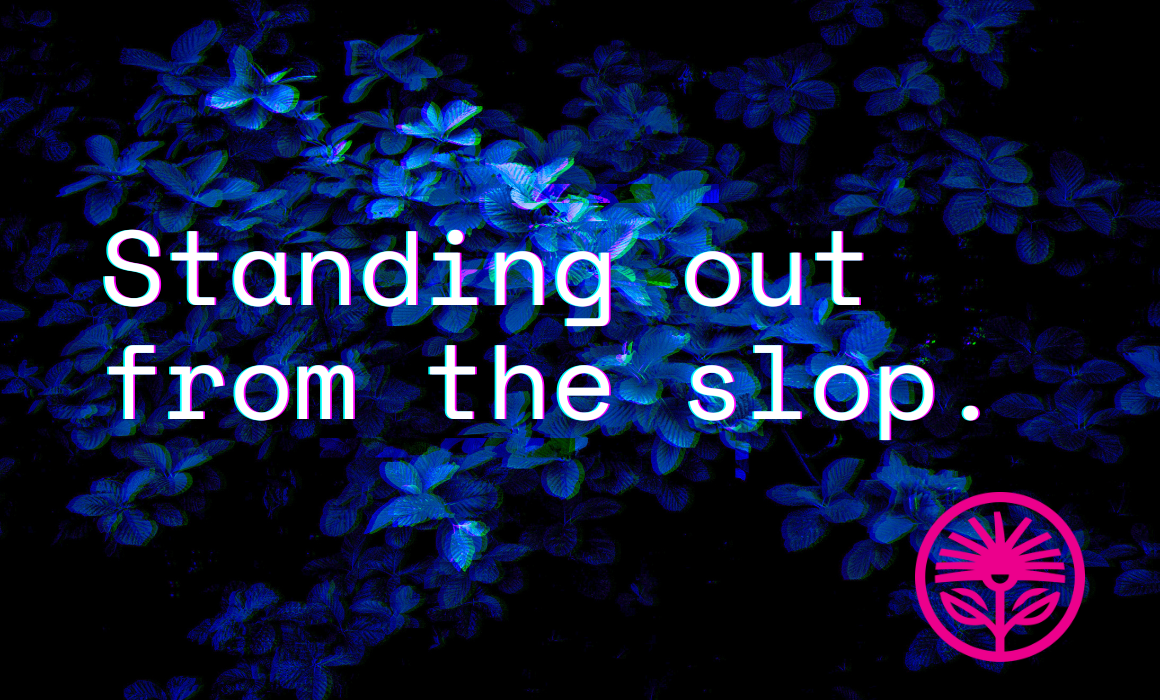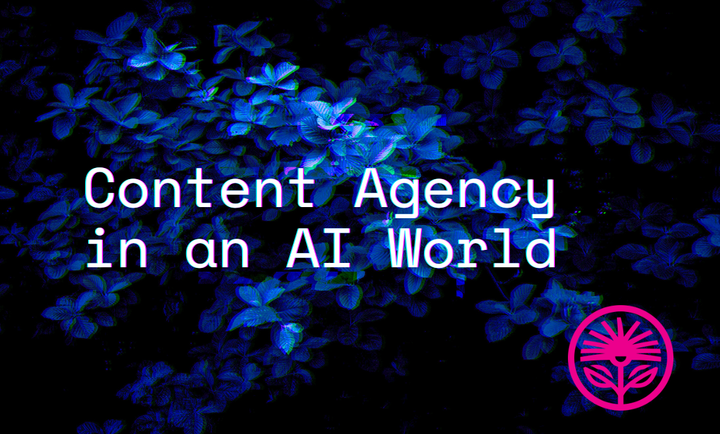Standing out from the slop — Kelford Labs Weekly
Creating compelling content in a world of AI


“I’m increasingly of the opinion that sharing unreviewed content that has been artificially generated with other people is rude.
Slop is the ideal name for this anti-pattern.
Not all promotional content is spam, and not all AI-generated content is slop. But if it’s mindlessly generated and thrust upon someone who didn’t ask for it, slop is the perfect term for it.”
— Simon Willison
Everyone who publishes content on the internet has to answer this question:
Why would someone consume what I’ve produced instead of something that AI has produced—faster, cheaper, and more abundantly?
Let’s face it, the internet is quickly being inundated with slop.
Which means getting discovered, noticed, and remembered is becoming so much more difficult. Because endless slop overwhelms our customer’s ability to sort and filter what’s actually good.
So how are marketers with unique, interesting, and useful content supposed to stand out in a sea of slop?
Here’s how:
1) What AI can and can’t do
“The enemy must be regarded in the same way; you must understand how to look beyond his dangers and consider how he might become useful to you.”
— Plutarch
First things first: We’ve got to know what we’re up against.
Do you have a good, experienced understanding of the capabilities of the current AI models and tools?
How good are they, right now, at producing content that’s similar to yours? Where do they fail, where do they flourish?
I constantly test their abilities, not because I’d ever replace myself with them, but to see in what ways I’ve already been replaced—so I can improve.
Right now, whatever you want to call whatever it is I do—AI can’t do it. Claude can match my tone and style, but not my content. NotebookLM can grab the quotes, but it doesn’t get the context. ChatGPT can’t do much of either.
But, as they get better, so must I. So must you.
But how?
2) What only you can do
“Being good at what nobody is doing is better than being great at what everyone is doing. But being an expert in something nobody is doing is exponentially more valuable.”
— Greg McKeown, Effortless
Humans and Large Language Models crave the same thing: novelty.
When we learn something novel, when we discover a new trick, when we happen upon something useful that we never knew existed—our brains light up with delight.
Large Language Models and their makers crave something similar—novel tokens. The basic building blocks of their ability to create coherent language. It’s what they need to hoover up from us, humans, because they struggle to create novelty themselves.
It’s devastatingly crass to say, but, in many ways, our ability to compete with LLMs and the people who use them to generate slop will come down to our ability to generate more novel tokens. To create ideas, concepts, and mental models that didn’t exist before we came up with them.
Yes, the LLMs will hungrily devour the novel tokens we produce (though one can take steps to block them), but our advantage is our ability to continue generating novelty by leaning into what makes us unique.
So the question is: What set of inputs—random or planned circumstances—are unique to you?
What sort of “training data,” to use the LLM term, do you have access to that no one else does?
As just a small example, I have access to numerous out-of-print books on topics of interest to me, my clients, and my audience, which allow me to generate novel combinations of tokens that aren’t in the training set for any LLM.
But beyond that, my weird concoction of experiences are completely unique to me—my childhood, my education, my work history. No one else has had the exact same life that I’ve had.
So it’s up to me to use what I’ve learned and been through to create novel ideas no one’s ever had before.
Just that simple. Just that hard.
3) Leveraging novel inputs
“An idea is not a single thing. It is more like a swarm.”
— Steven Johnson, Where Good Ideas Come From
The good news and bad news is that there is something we can do to stay ahead of LLMs.
Good because we’re in control. Bad because we’ve got work to do.
The question becomes, what sources of novel inputs do you have access to that no one else has—and how can you increase your consumption and integration of that novelty into your worldview, and subsequently your content?
Maybe it’s your one-on-one experiences with your clients. How curious are you being about what they say, about what they think, about what they value? How can you collect (keeping everyone’s privacy and confidentiality in mind!) that information and learn from it?
Maybe it’s your unique access to a particular community or interest group—maybe you’ve accumulated a certain level of trust and credibility there. How can you learn more from that community and what they value? How can you strengthen your relationships with those individuals?
The important thing here is that we’re able to identify a “cornered resource,” in Hamilton Helmer’s terms, that we alone have access to, and that we alone can continue harvesting for novelty.
The more we can increase our inputs of novel, useful, and, most importantly, rare data, the better off we’ll be.
4) Generating novel outputs
“The immediate effect of encountering new forms is, for many people, the cause for scampering back into old ones, where they feel more at home, more comfortable.”
— Marshall McLuhan
The onslaught of AI can make us want to retreat back to where we feel safe and comfortable.
Just doing what we’ve always done and hoping it keeps working.
That’s, of course, a common way of approaching any problem. Ignoring it and hoping it goes away. And maybe it will!
But if it doesn’t—or if it doesn’t anytime soon—we can be doing something to protect and preserve our advantages: We can produce novel tokens that continue to delight, inform, and attract our very best customers.
The way to react to a sea of slop is not to turn our backs on content entirely. It’s to provide human, organic, insightful content to the people looking for it.
Your best customers don’t want slop, they want help. The slop is simply in the way.
So what do you do to create novel tokens—unique ideas and concepts your customers can benefit from?
First, identify your unique value.
Why do customers choose you over your competitors? What questions do you ask your prospects that nobody else knows to ask? What patterns have you identified that are invisible to everyone else?
Then, show, don’t tell.
Instead of just promising benefits in your content or merely rehashing best practices, demonstrate your expertise by delivering value right in your content.
Ask those questions only you know to ask, and focus on the unique value you create for your very best customers. Give them a sample of what it’s like to work with you—a unique experience only you can provide.
You’re not trying to attract a mass of faintly-interested onlookers (like the AI slop is), you’re looking to deliver value to a particular type of buyer.
Next, be extra “boring”.
Dig into the specialized, even mundane, parts of your process that AIs can never replicate because they’ve never been there, never done the things you’ve done. The more specific you are, the more credible you become.
The more human you seem.
Finally, don’t follow the crowd.
The temptation is to do what everyone else seems to be doing—which is either having AI generate slop content on their behalf, or simply ignoring it and pretending it doesn’t exist.
Instead, we can carve our own path—one that’s irreplaceable and irreplicable.
Because our job as entrepreneurs isn’t to simply gain customers—it’s to deliver extraordinary value.
And our job as marketers isn’t simply to gain awareness—it’s to demonstrate value at a distance to the people who want it most.
Which means we need to focus on what we’re best at, what we can do that no one else can do.
That way, we can generate content that no one else could.
No competitor, and no computer.
Kelford Inc. helps hands-on entrepreneurs and founders with complex marketing challenges define and articulate their unique value to their very best customers.
We’ll show you the way to always knowing what to say.



